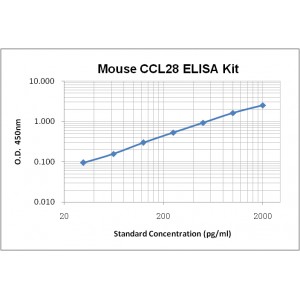More info
Assay Range | 31.2-2,000 pg/mL |
Sensitivity | 10.0 pg/mL |
Specificity | No cross-reaction with other related substances detected |
Size | 96T |
Storage | Store at 2 - 8ºC. Keep reconstituted standard and detection Ab at -20 ºC |
Assay Principle | Sandwich ELISA |
Sample Volume | 100 µL final volume, dilution factor varies on samples |
Detection Method | Chromogenic |
Kit Components
1. Recombinant Mouse CCL28 standard: 2 vials
2. One 96-well plate coated with Mouse CCL28 Ab
3. Sample diluent buffer: 12 mL - 1
4. Detection antibody: 130 µL, dilution 1:100
5. Streptavidin-HRP: 130 µL, dilution 1:100
6. Antibody diluent buffer: 12 mL x1
7. Streptavidin-HRP diluent buffer: 12 mL x1
8. TMB developing agent: 10 mL x1
9. Stop solution: 10 mL x1
10. Washing solution (20x): 25 mL x1
Background
CCL28, also known as mucosa-associated epithelial chemokine (MEC) and CCK1, is a member of the CC chemokine family. Mouse CCL28 is synthesized as a 130 amino acid (aa) precursor protein with a putative 22 aa signal peptide and a 108 aa mature protein. The mature mouse CCL28 is 83% aa identical to its human counterpart. CCL28 is most closely related to CCL27/CTACK in the CC chemokine family.
CCL28 mediates the downstream signaling pathways by binding to G-protein coupled receptors CCR3 and CCR10. CCL28 is expressed by columnar epithelial cells in the gut, lung, breast and the salivary glands and attracts the mucosal homing of T and B lymphocytes and the migration of eosinophils. CCL28 is constitutively expressed in the colon and is upregulated by pro-inflammatory cytokines and certain bacterial products, suggesting a role in recruiting effector cell to sites of epithelial injury. Elevated levels of CCL28 have been found in patients with atopic dermatitis. Increased expression of CCL28 is also associated with asthma, psoriasis, vulgaris, and bullous pemphigoid.


